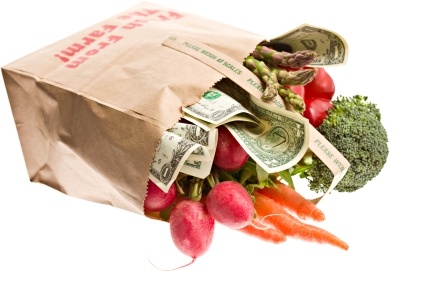
Eating organic is something many of us aim to do; however, doing so on a student budget can be tricky. Here are some of the top tips for affordably eating organic.
1. Look for generic organic brands made by the stores which carry them. Costco, Whole Foods, and Central Market have their own organic foods that are much more affordable.
2. Opt for frozen veggies, fruits, and meats if the fresh prices are out of your range.
3. Choose bulk over packaged foods. Many stores like Central Market, HEB, Whole Foods, and Sprouts have an excellent selection of bulk food items which can be snagged at a fraction of the price.
4. Follow what is in season because the locally grown food is usually cheaper than that which had to travel miles to the store. Here is a guide for Texas.
5. Support local farms through CSAs or Farmers Markets. Also, if you shop toward the end of the market you can likely get deals because they'd rather sell it than take it back to the farm.
6. Grow at least one thing yourself.
7. Coupons! Websites or social media sites of your favorite companies have coupons and specials. Some other sites are Mambo Sprouts, Saving Naturally, Organic Deals, My Organic Coupons, Organic Deals and Steals. Writing companies with compliments or complaints usually will result in their sending coupons.
8. Read Wildly Affordable Organic for tips on organic eating for $5 a day or less.
9. Buy at least the dirty dozen organic if you can't afford to buy everything organic. The dirty dozen are from the Environmental Working Group's research and have the most pesticides:
- Peaches
- Apples
- Sweet bell peppers
- Celery
- Nectarines
- Strawberries
- Cherries
- Pears
- Grapes (imported)
- Spinach
- Lettuce
- Potatoes
The Environmental Working Group classified the following as the clean dozen, which have fewer pesticides:
- Papaya
- Broccoli
- Cabbage
- Bananas
- Kiwi
- Sweet peas (frozen)
- Asparagus
- Mango
- Pineapple
- Sweet corn (frozen)
- Avocado
- Onions
10. Research other sustainable food options in your area, from businesses to stores, at eatwellguide.com
Resources:
 Janessa Benedict is a senior student at AOMA Graduate School of Integrative Medicine. She currently writes a financial aid newsletter, contributes to an Oriental medicine website, and looks forward to saving the world.
Janessa Benedict is a senior student at AOMA Graduate School of Integrative Medicine. She currently writes a financial aid newsletter, contributes to an Oriental medicine website, and looks forward to saving the world.

